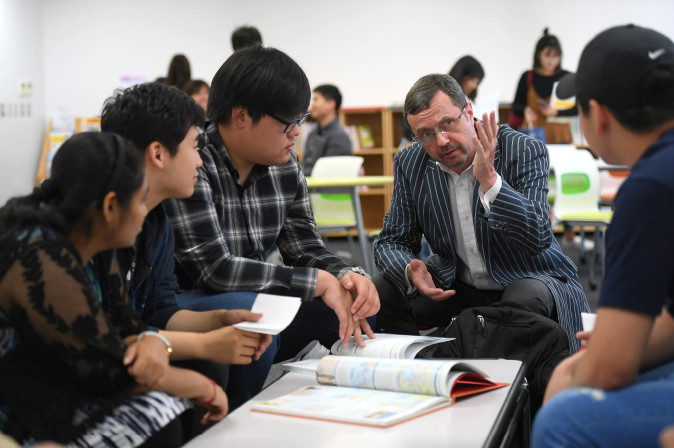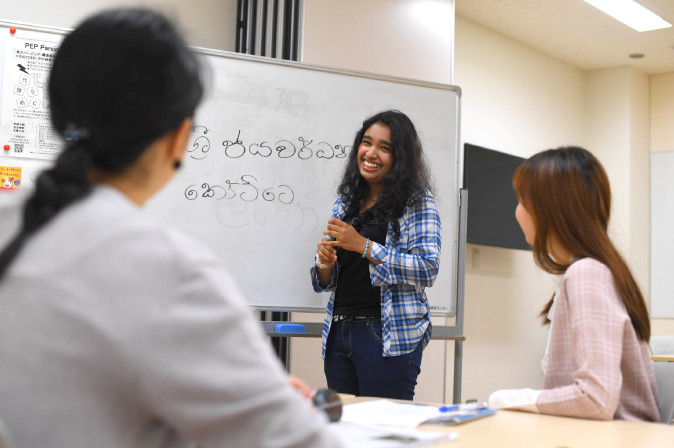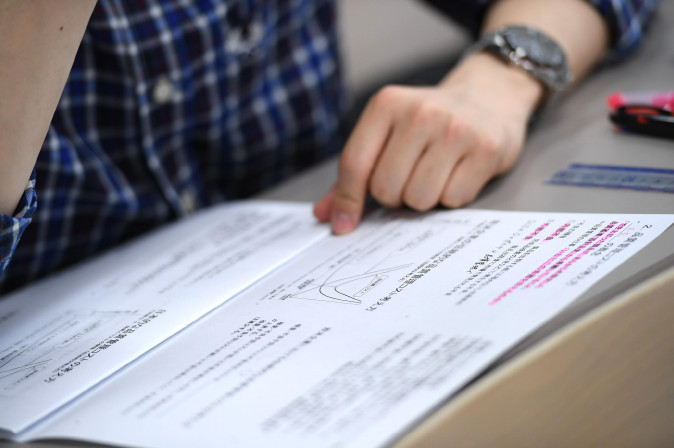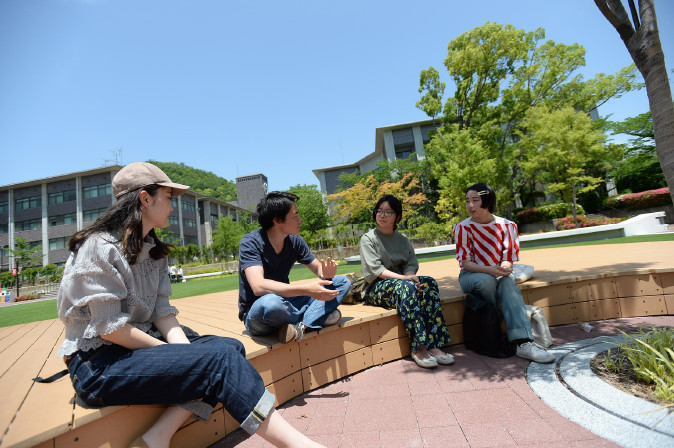Chapter II
Progress of Discussions to Date and Future Directions
1.Progress of Discussions to Date
(1)Enhancement of curricular and extracurricular learning and co-creation policy
1)Enhancement of education in the formal curriculum
In response to requests from the Student Union in the area of curricular learning, we confirmed that a review would be conducted of the effects of academic reforms implemented thus far, and the results shared with students. We also confirmed that faculty development (FD) programs would be organized with a view to further improvements in teaching, and that we would continue to conduct multi-faceted reviews of the impact of academic reforms on student growth and satisfaction, together with programs to develop classes that foster self-directed learning.
Currently we are expanding the portfoliofunctions of manaba+R to include mechanismsto enable faculty members to checkthe study records of individual students andprovide learning advice. In response to concernsraised by the Student Union over personalinformation protection, we confirmedthat in the course of this expansion carefulconsideration will be given to the scope offaculty members authorized to view studentrecords.
As part of the AY 2020 reforms of liberalarts education, we are also seeking torender learning progress in the liberal artscurriculum more visible, and advancingteaching reforms that place students at thecenter of the learning process. We confirmedthat in the development of new subjectsand subject design in the liberal artseducation reforms, we will work to incorporatestudent demand for state-of-the-artfields and fields connected with everydaylife, and to use liberal arts seminar subjectsto address specific themes that studentswish to study.
2)International student support and other forms of internationalization, inclusive student support, and promotion of diversity and inclusion
In the area of international student supportand other forms of internationalization,the Student Union and Graduate StudentCouncil demanded the enhancement andstrengthening of academic and campus lifesupport for the growing number of internationalstudents (including expansion andenhancement of English-medium courses,and the need for Japanese language learningsuppor t). In response, we confirmedthat the university would enhance supportfor international student before and afterenrollment, provide support in partnershipwith government authorities and externalorganizations and, in order to respond tointernational students’ diverse suppor tneeds, launch an “international studentsupport coordinator” system from AY 2019.
In regard to inclusive student support and the promotion of diversity and inclusion, the Student Union called for the development of environments in which an even more diverse range of students can learn together. The following measures were confirmed in this area.
1.Expand the Student Success Program (SSP) to provide support for smooth transition from senior high school to university, assisting students to gain independence and grow especially in their first year of university.
2.Build systems to enable not only individual-level consultation and support on gender and sexuality issues, but also information provision and awareness-raising across the entire university community. Strengthen systems for supporting students with disabilities, in light of the growing number of students in need of support and the demand for assistance in English.
3.Raise the proportion of students receiving financial aid scholarships by assigning unspent funds from the existing scholarship budget in AY 2019 to such financial aid scholarships. Discuss approaches for AY 2020 and beyond during AY 2019, taking into account developments in the national government’s policies for alleviating the financial burden of higher education.
3)Enhancement of extracurricular learning
The Student Union and university authorities confirmed their agreement on the significance of extracurricular learning and self-motivated student activities as means of achieving the principles of the Ritsumeikan Charter and the university’s student development goals. They also confirmed the impor tance of achieving a balance between curricular and extracurricular pursuits. Based on this shared understanding and matters raised by the Student Union, the Plenary Council confirmed that the following activities would be pursued.
All faculty members will be made fully aware of the system of Certificates of Participation in Competitive Events, which is used to make allowances for unavoidable class absence owing to par ticipation in sporting events, competitions and like, and programs shall be pursued that respond to students’ interest in pursuing self-motivated, autonomous learning. These activities will be founded on the principle that student should make the maximum possible effort to catch up on their missed classes (gather materials, etc.) on their own. When requested by students, class instructors will exercise their judgment to provide students with guidance and assistance in forms that may include: (1) distribution of materials; (2) confirmation of topics covered in class and explanation of key points; (3) directions on self-study prior to the next class; (4) notification of other matters.
In addition, in regard to facilities and equipment for extracurricular activities, we confirmed that priority would be given to ensuring safety and security, and that the Division of Student Affairs (Office of Student Affairs and Office for Athletes and Sports Services) would be the first point of contact in the case of problems.
(2)Enhancing the quality of campus environments
In regard to development of campus environments, the Student Union continued to request that the matters confirmed at the AY 2016 Plenary Council be given more concrete shape, and that the university furnish oppor tunities for discussion that reflect the diverse opinions for students at the stage of formulating campus development plans. The Student Union also called for discussion of the following three points which had high levels of interest among students in a survey conducted independently by the Student Union: (1) improvement of dining environments, including user amenity and turnover rates in cafeterias; (2) re-consideration of the goals and methods of the university’s campus-wide no-smoking policy; (3) improvement of independent training environments including flexible use of air-conditioning facilities and opening of facilities during examination periods.
We confirmed that the following steps would be taken in response to the above points.
1.Enhancement of campus environments is a matter closely connected with students’ daily lives and one in which students have a high degree of interest. The university, in collaboration with the Ritsumeikan Co-op, shall continue to engage in discussion in campus discussion meetings and other forums with a view to pursuing campus-level improvements.
2.Positions on campus-wide no-smoking policy continue to differ, with the Student Union demanding a re-appraisal of the policy and the university authorities aiming to make the entire university smokefree. We will pursue further discussion of this matter into the future.
3.In regard to the expansion of facility opening hours during examination periods, we will assess actual usage during the AY 2018 fall semester examination period, and open some facilities on a trial basis.
(3)Academic enhancement of the graduate schools
At the last Plenary Council, discussions were held and agreement reached on the following academic issues in the graduate schools: 1) enhancement of the TA (Teaching Assistant) system; 2) enhancement of graduate student career path support; 3) development of research commons and other aspects of the research environment.
1)TA system
The members of the Plenary Councilconfirmed their shared appreciation of theimportant academic role of the TA system incareer development through teaching experiences,as well as the provision of financialsupport. Based on this understanding, weare making efforts to give many graduatestudents the oppor tunity to experiencework as a TA. We are looking at ways toexpand opportunities for TA activities alongexisting lines, including announcementof TA recruitment periods on the website,open calls for general education TAs onmanaba+R, and placement of TAs in undergraduatesubjects with close academic andresearch connections. We also confirmedthat strategies would be formulated to helpstudents in stand-alone graduate schoolsf ind TA oppor tunities in undergraduateclasses connected with their areas of specialization.
2)Enhancement of career path support programs
In response to demands from the Graduate Student Council, the university authorities committed to concretely developing measures such as establishment of subsidy and suppor t programs to raise research motivation, expansion and improvement of conditions for post-doctoral positions, and expansion of existing programs such as subsidies for conference attendance in doctoral programs.
In particular, the we confirmed that existing projects funded under the Four th-Phase Career Path Development Support Program (2016-2020) and the graduate school enhancement policies identified as priorities in for the second half of the R2020 plan (academic conference scholarships, research activity promotion grants, basic skills enhancement support, doctoral dissertation publication subsidies, English-language academic ar ticle submission support, etc.) would be subject to progressive improvements with the aim of expansion. We also announced the intention of developing a new framework for the expansion of post-doctoral positions.
3)Development of the research environment (Research Commons, etc.)
The Graduate Student Council demanded the alleviation of the shortage of space in the Research Commons on the Kinugasa Campus and Osaka Ibaraki Campus (OIC). We agreed that in light of the limited space available, rather than thinking mechanically about seat numbers, the university would conduct reviews and improvements with a view to the ideal Research Commons environment for each campus, taking into account disciplinary differences in styles of education and research. At OIC, where the number of graduate students is growing considerably as new cohor ts are added yearly to the recently-established graduate schools, we decided to institute provisional measures. The Plenary Council confirmed that development of research comments and other aspects of the research environment would be pursued in full consultation with graduate students, as they have been thus far.
NEXT:Chapter IIProgress on university projects and future directionsStudent Success Program(SSP)
The SSP is a program of student support designed to enable each individual student to become an autonomous learner through all parts of their student life, both curricular and extracurricular, and to achieve the maximum possible growth. Individual support activities, seminars, and other initiatives for enhancement of campus life have been launched progressively since AY 2017, and rolled out across all three Ritsumeikan University campuses since AY 2018.
Career path support
RU has systems to support graduate student career paths (employment and further study) that link admissions, academic affairs, career development, scholarships, and other programs across the graduate schools as a whole.
2.Progress on university projects and future directions
(1)Progress on the first phase of the co-creation policy (AY 2019-2020) based on matters confirmed at the AY Plenary Council
The Student Union has emphasized the need to render progress on educational quality enhancement visible as a precondition to pursuing the co-creation policy. We have acknowledged this need and are producing a Learning and Growth Report that outlines the key features and tendencies in students’ learning, as evidenced in the learning and growth survey. Following discussion with the Student Union, this report will be published on the university website. We are now working to verify the growth outcomes of activities such as study abroad and extracurricular pursuits.
We have established a Council for theAdvancement of Co-Creation Policy as anorgan for routine collaborative discussionacross the Divisions of Academic Affairs,Student Affairs, and International Affairs, inorder to create a comprehensive structurefor implementation of co-creation policythat encompasses both learning suppor tand campus life, and both domestic andinternational students. Moreover, in orderto secure financial resources for the policyfrom within the overall scope of the currentbudget, we have partially reorganized ourbudget categories, while taking full care toensure that existing projects are not affected.Co-creation initiatives in each Collegeand Graduate School will form the basis ofthe overall co-creation policy. We will reformthe educational strengthening budgetsystem that provides the basic source offunds for these initiatives, and each individualCollege and Graduate School will determinehow to use this budget in accordancewith their own characteristics, and explainthe content and outcomes of their initiativesto students.
The following advancements have been made in the co-creation policy and associated initiatives.
1)Progress on enhancement of curricular and extracurricular learning and co-creation policy
1.Enhancement of education in the formal curriculum
- To facilitate academic advising in line with learning processes, we added a “management function” to manaba+R that provides each College and Graduate School with an overview of its students’ study history and advising records (implemented on a trial basis in three Colleges from AY 2019).
- We determined to undertake a reform of liberal arts education from AY 2020 and clarify the positioning and learning outcomes of each subject group and individual subject, to progressively restructure the “peace and democracy” category of foundation liberal arts subjects into a new “Ritsumeikan subjects” category that incorporates subjects addressing future changes in society and active learning subjects, and to establish a new foundation liberal arts subject category of “art and creation.”
2.International student support and other forms of tudent support, and promotion of diversity and inclusion
Global learning
- In order to furnish domestic students withopportunities to gain experience overseasat least once during their studies, in AY2018 we signed new partnership agreementswith three universities and educationalinstitutions internationally (bringingthe total number of agreements to 457).RU now holds first place in the nationalranking of number of students experiencingoutbound mobility under inter-universityagreements (JASSO, 2018).
- We added one extra class each to the Global Fieldwork Project and Intercultural Understanding Seminar, both of which are short-term study abroad programs in which students can participate easily. (These programs now have a total of five and 20 classes respectively).
- Beyond Borders Plaza (BBP), a space for curricular and extracurricular language study and co- learning and exchange between domestic and international students, recorded a total of 50,000 visitors in AY 2018, and is advancing programs for both language learning and international exchange across all three campuses.
- In order to expand co-learning in the formal curriculum, we expanded the number of liberal arts classes offered in English and foreign languages for new learners from 119 classes in AY 2018 to 150 classes in AY 2019.
Systems for comprehensive learning and campus life support
- We al located par t of the educat ional strengthening budget to campus- and university-wide collaborative projects, and solicited project proposals from Colleges and Graduate Schools. Ten projects were selected, including one for inter-College learning support on the Biwako Kusatsu Campus (BKC).
- In acknowledgment of the important role played by ES (Educational Supporters) in peer learning, we raised ES payments (hourly rates) and standardized them across the three campuses.
- From AY 2019, instructors are obliged to provide directions on learning outside class in their subject syllabus, in order to promote study outside class and ensure tasks are set appropriately on the assumption that students will undertake such study.
- In science and engineering-based colleges, we have made improvements to operating hours and venues for learning consultations, so that more students can access opportunities for remedial education.
- With a view to enhancing support for first-year students , the number of SSP Coordinators has been increased on each campus as of April 1, 2019. We will formulate and progressively implement measures responding to the growth in individual support needs, provision of organized support at the level of seminars and groups, and collaborative projects with Colleges utilizing the educational strengthening budget. Moreover, we are considering extending the pre-enrollment support program (which is designed to foster understanding of dif ferences in learning and student life between senior high school and university) from the existing coverage (some students admitted under special admission programs) to include students at affiliated schools.
- Colleges are working together with the Division of Student Affairs to provide support for Orientation Conductor activities in accordance with the Memorandum on Orientation Conductor Activities and Framework for Orientation Conductor Activities and Support (contained in the Memorandum of the AY 2018 Plenary Council). The task that remains for the AY 2019 Plenary Council is to examine not only Orientation Conductor activities but the entire field of first-year education, with a view to developing a more concrete understanding of the concerns facing new students and formulating ways of addressing them. The AY 2019 Plenary Council will pursue discussions based on actual student conditions, referring to the results of the survey of first year students that the Student Union plans to undertake.
- We are looking into ways to provide support under the SSP to recipients of financial aid scholarships who are facing difficulties in pursuing their studies. This support will be formulated in conjunction with changes to the financial aid scholarship program for AY 2020 that are made in light of the national government’s new system for alleviating the burden of higher education costs for students.
- We decided to assign an international student support coordinator to each campus from AY 2019, to function as a first point of contact for a range of international student consultations and to connect students with specialized services as necessary. We have already appointed coordinators for Kinugasa and BKC and they have started offering support in collaboration with the Colleges, Graduate Schools, and external organizations.
- We have appointed two extra full-time faculty members to strengthen the provision of Japanese language education.
Promoting diversity and inclusion
We have recently been developing inclusive student support structures including the establishment of Support Rooms and the Special Needs Support Office, and the launch of the SSP. The following is a summary of progress and remaining challenges in diversity and inclusion based on these initiatives and the matters discussed at the AY 2018 Plenary Council.
- In the context of constructing consultation and suppor t structures for diverse students, we need to take an organized approach to the development of consultation and support on gender and sexuality issues. Based on this understanding, we have established an exploratory project on structures to support sexual minorities and provision of diverse support under the Division of Student Affairs. The project team is planning to report on the outcomes of its deliberations around July 2019.
- In the area of support for students with disabilities, we increased the number of support coordinators in April 2019, and support structures are also being expanded.
- In regard to expansion of financial aid scholarships, work is in progress toward raising the recipient rate among students from households with annual incomes under 4 million yen. In response to the national government’s rollout of a new system to alleviate the costs of higher education in AY 2020, we will pursue discussions on the re-design of financial aid scholarship programs through the latter half of AY 2019.
Enhancement of learning beyond the formal curriculum
- We will explore ways to support the further enhancement of self-directed learning beyond the formal curriculum. Specifically, improvements will be made to the growth support scholarship programs that currently support extracurricular activities and are in operation until AY 2020.
- One topic of discussion at the AY 2018 Plenary Council was the Certificate of Participation in Competitive Events. We have now revised the format of this certificate in order to promote understanding of the significance and purpose of the certificate among both students and faculty members.
2)Enhancement of campus environments
- In the area of campus environment enhancements, the Student Union is calling particularly for a continuation of the AY 2018 discussions on the campus-wide no-smoking policy. There is a need to address this issue taking into account the amendments to the Health Promotion Act (hereafter the “amended HPA”) which will come into effect in July 2019. The following measures will be taken.
1.Quit-smoking support areas
We will redesign these areas to satisfy the conditions of the amended HPA. We will institute new measures to prevent passive smoking and endeavor to continue reducing smoking rates in accordance with a three-year plan, with a view to eventually disestablishing the quit-smoking support areas.
2.Campus-wide no-smoking policy
When the amended HPA comes into effect, we will change the current “campus-wide no smoking” designation in accordance with the amendments to a “smoke-free premises excluding designated outdoor smoking locations,” while continuing our efforts to achieve a completely smoke-free campus under a three-year plan.
3.Tackling smoking on campus
We will continue working to ensure that all faculty, staff and students comply with campus no-smoking policies.
3)Enhancement of graduate school education
- In the Master’s programs, the number of enrollees increased in AY 2018 and remained at almost the same level in AY 2019, thanks to the tuition fee reductions instituted in AY 2017, and well as the pro-active pursuit of programs and activities to communicate the benefits of learning in the university’s graduate schools. The increase in graduate school enrollments also contributes to the enhancement of the undergraduate education environment through measures such as the provision of TA support in undergraduate classes.
- In the area of career path support for graduate students after enrollment, in AY 2019 we expanded the scope of the doctoral disser tation publication subsidy established in AY 2017, and established Starting Researcher systems and Starting Assistant Professor systems to provide a springboard for cultivation of new research professionals.
- In AY 2019 we launched the Cross-Creative Human Resource Development Program to foster doctoral researchers across multiple graduate schools in collaboration with companies and the local community, and in AY 2019 we re-applied for the Ministry of Education, Culture, Sports, Science and Technology (MEXT) Doctoral Program for World-leading Innovative & Smart Education.
First-year education
First-year education is a comprehensive educational program extending across curricular and extracurricular realms, including support for adaptation to not only university learning but also campus life.
ES(Educational Supporter)
An ES is an undergraduate student who provides support for instructors and students in class. By assisting with in-class group work, responding to students’ questions, and other forms of support activities for both students and instructors in class, ESs plays a role in generating more ef fective learning outcomes. These activities are also an opportunity for ESs themselves advance their specialized studies and to develop more broad-ranging knowledge and skills.
Peer learning
This term refers to mutual support activities among learners, with the expectation that by helping one another, students will experience growth for themselves at the same time as supporting the growth of others. Close to 3,600 RU students across 36 different organizations are involved in peer learning, including the Orientation Conductors who provide suppor t in small-group classes for first-year students.
Starting Researcher system
This system, which began operation in AY 2019, is designed to allow those completing doctoral programs at RU to play roles in enriching basic research across a variety of fields and encourage the production of research outputs, with a view to helping them find work as research professionals at research institutes, companies and the like soon after completing their studies.
Starting Assistant Professor system
This system, which began operation in AY 2019, is designed for two purposes: (1) to help those completing doctoral programs in RU’s four science and engineering-based graduate schools to accumulate a stronger research track record and move quickly to academic positions within and beyond Japan, and (2) to encourage young talent to enrich basic research in a variety of fields and produce research outputs at the same time as gaining teaching experience.
Quit-smoking support areas
These areas have been operating on each of the university’s campuses since AY 2018 with the aim of helping users quit smoking by providing them with guidance and raising their awareness of the impor tance of quitting. In order to advance the university’s initiatives to prevent passive smoking in line with the amended Health Promotion Act, from AY 2019 these areas are being progressively developed so they meet the specifications for designated outdoor smoking areas.
(2)Directions for the second phase of the co-creation policy(AY 2021-2022)
The second phase of the co-creation policy period (AY 2021-2022) will encompass enhancement of graduate school education and research, with discussions involving the Divisions of Academic Affairs, Student Affairs and International Affairs as well as the Divisions of Integrated Primary and Secondary Education, Research, and Career Services. Discussion of the second-phase policy are just beginning, but the issues currently being tabled at meetings of the Council for the Advancement of Co-Creation Policy (see p. 6) are as follows.
Rendering learning outcomes visible
- We will publish various topics related to the task of rendering learning outcomes more visible on an ongoing basis in Learning and Growth Reports. Moreover, we will work together with students to formulate approaches to learning within and beyond the regular curriculum that raise students’ motivation and initiative, taking into account the results of learning and growth surveys, the assessments of educational outcomes conducted by each College, class evaluation surveys, and surveys by the Division of Student Affairs, Student Union and others.
Supporting learning and campus life
- We will begin working on the development of a comprehensive learning records system that enables students to review their own curricular and extracurricular learning, on-campus activities, and off-campus activities such as study abroad, and to utilize them in the future studies and career planning. This work will include formulation of mechanisms for the provision of learning advice based on the information contained in learning records.
- We will consider approaches to the university-wide provision of writing support (online and/or face-to-face in the formal cur riculum, development of common learning materials, co-curricular tutorials,etc.) in both Japanese and English. This suppor t is necessary in order to foster and enhance students’ skills of written expression, essential for the production of a graduation thesis or research project.
- We will pursue initiatives for the classification of international students’ concerns and accumulation and systematization of support strategies, through the activities of the international student support coordinators.
- We will consider ways to provide deeper levels of student suppor t. Specifically, these include enhancement of support through analysis of SSP cases, coordination of SSP-based support with College-level interviews with students showing unsatisfactory progress, expansion of SSP pre-enrollment support to affiliated schools and students admit ted under special admissions programs, and re-development of peer learning systems from the standpoint of “individual” growth.
- With a view to advancing inclusive student support and promoting diversity and inclusion, we will consider developing a comprehensive service provision model for diverse students and diverse learning styles to cater for diverse students (individualization of learning).
Study abroad and international exchange
- We will develop new study abroad programs based on assessment of the learning and growth effects of study abroad.
- We will fur ther invigorate study abroad and international exchange activities through the BBP, and promote language learning through use of the communication room, which is the hub of language learning support, and the self-study materials therein.
- We will fur ther expand the number of curricular subjects and classes taught in English and other foreign languages, as venues for curricular co-learning among international and domestic students.
Enhancement of the graduate schools and research
- Through programs and activi ties that showcase the attractions of learning at the university’s graduate schools to undergraduate students in an accessible format, we will increase the number of undergraduate students advancing to the graduate schools and strengthen the linkage between undergraduate and graduate school learning.
- We will situate the career path support programs for graduate students as part of the co-creation policy, and fur ther enhance and review these programs as necessary with a view to developing pathways to employment in research-based professions and a broad range of career options utilizing specialized capabilities.
- We will continue to explore strategies for the enhancement of graduate school education and research in tandem, in acknowledgment that supporting graduate students’ research activities and enhancing individual students’ research skills are important tasks in the context of raising the university’s overall research capability.
Contents
- Chapter I.Significance of and Preparations for the AY 2019 Plenary Council
- Chapter II. Progress of Discussions to Date and Future Directions
- Chapter III. Tuition Policies for AY 2020 and AY 2021
- Document







